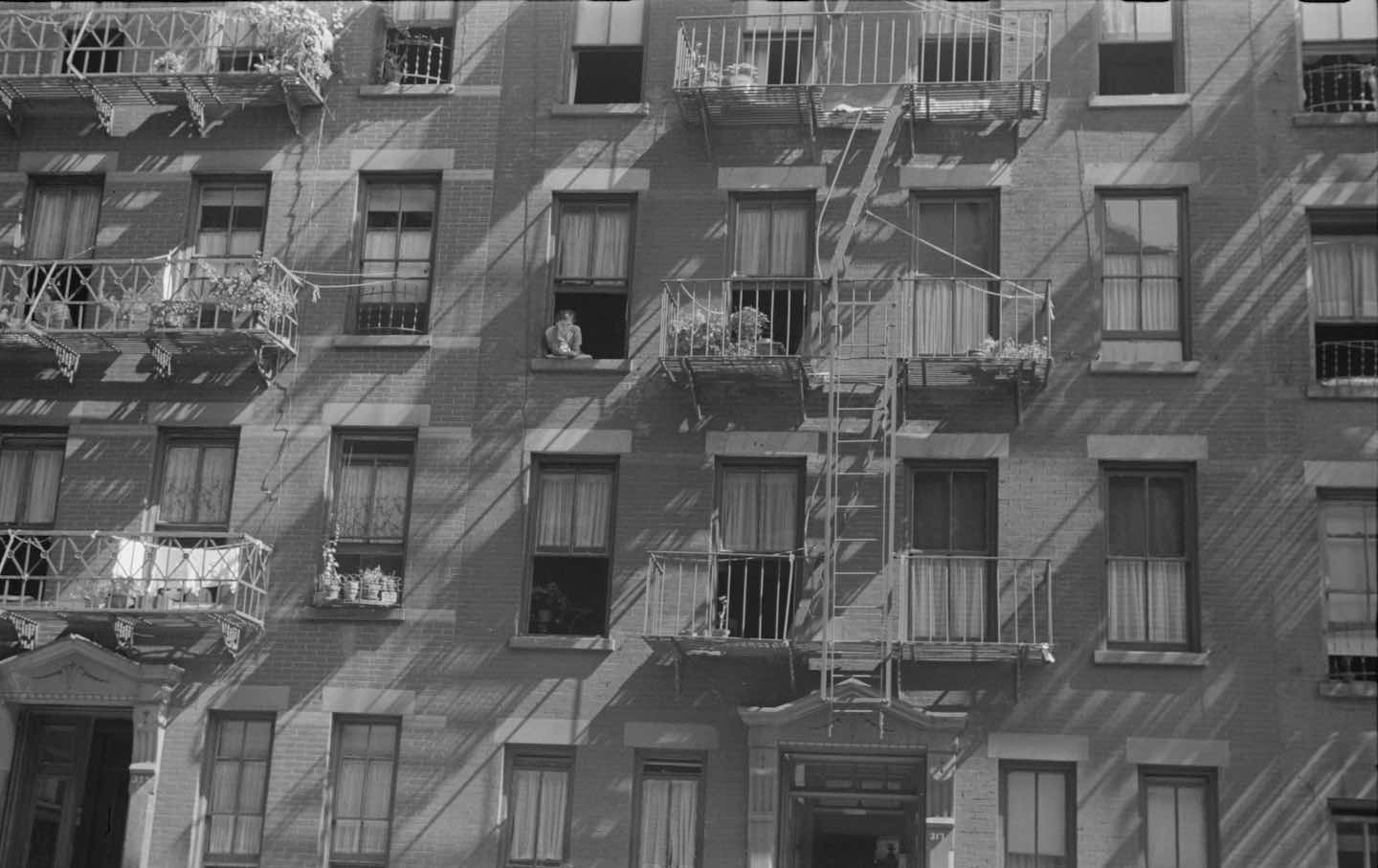A Modern-Day Fable for the Tenant Class
Hilary Leichter’s fiction examines contemporary crises like work and inequality through the lens of magical realism. Her latest novel, Terrace Story, is a parable about the family and housing.

A New York apartment building.
(Photo by Walker Evans / Heritage Art/Heritage Images / via Getty Image)In Hilary Leichter’s Terrace Story, a family of three in a large city struggles to find enough space to live comfortably. Annie, Edward, and their baby, Rose, have just moved. Before they became parents, Annie and Edward lived in a nice apartment with a view of a tree, but a rent increase forced them to move into a cheap, cramped apartment without any view at all. They are a dual-income couple struggling to climb the corporate ladder and provide for their daughter. When Annie returns to her nondescript office job after maternity leave, she finds that her coworker Stephanie has taken on most of her clients. Instead of indulging in jealousy or suspicion, Annie invites Stephanie over to christen their new, less-nice apartment. Stephanie suggests they go eat outside. But the apartment, Annie and Edward tell her, doesn’t have an outdoor space. Unfazed, Stephanie opens a closet door that somehow, magically, now leads to a terrace. A few nights later, after discovering that they can’t get to the terrace on their own, Annie and Edward begin inviting Stephanie over for dinner just to have access to this new alternate life. But they don’t yet understand why Stephanie desires to be a part of their family: They only see a single woman alone in the city, someone who is trying to meet her material and emotional needs without a family of her own.
Books in review
Terrace Story
Buy this bookAs Stephanie becomes a larger part of their lives, Annie’s importance begins to shrink. Her husband seems enamored with their new friend; the stories he tells at dinner and his very gaze exclude Annie. Baby Rose, meanwhile, is doted on by Stephanie. Maybe Annie is just being paranoid, but she can’t shake the feeling that Stephanie is trying to replace her: At work, Stephanie has already gotten Annie demoted, and at home, Edward seems a little too interested in her. When Annie is finally laid off, her hunch that Stephanie is trying to supplant her is borne out when she invites her over for dinner one last time. While Annie is in the apartment and Stephanie, Edward, and Rose are on the terrace, Stephanie closes the door from the outside. When Annie tries to reopen the door, they’ve all vanished. Her family has been stolen. Annie struggles to find the right word for what she feels. It’s just on the tip of her tongue.
This is a characteristic setup for Hilary Leichter’s novels: Her work explores the futility of labor and the limitations of motherhood. Somewhere between modern-day fable and anti-capitalist parable, Terrace Story explores what it takes to keep a family together.
In Leichter’s fiction, we’re already living in a postapocalyptic world, and her magical realism only emphasizes its stark conditions: Everyone’s trying to scrape by, and the lengths one will go to make ends meet strain the bounds of reality itself.
In her first novel, Temporary, an expansion of a short story that originally appeared in n+1, Leichter follows a woman who has “a shorthand kind of career. Short tasks, short stays, short skirts.” She tumbles from one comically threatening gig to the next, impersonating businessmen, pirates, mothers, and assassins. Between assignments, the unnamed narrator calls her chorus of “boyfriends” and tries to remember the stories her mother told her about the very first temping agency. Across this topsy-turvy world of temporary work, the narrator struggles to not just make rent but also find a sense of belonging. During one job, she even takes the form of a human barnacle. “How long is the lifespan of a barnacle?” she wonders.
While Temporary explores the narrator’s progressive immiseration one job at a time, Terrace Story zooms out to examine multiple origin stories. In the second section of the book, Annie’s parents, George and Lydia, are revealed to live in the same kind of economic precarity that she and her husband did. Annie’s family serves as just one example of all families alienated by capitalism. Lydia never wanted to be a mother, and she struggles to adjust to parenting. Meanwhile, George carries on a long-term affair, and his unfaithfulness eventually forces Lydia to respond in kind. As Annie’s family crumbles, she begins to drift in and out of daydreams. She wants to imagine a world where her parents stay together, a world where she might be granted the dream of a perfect nuclear family. Instead, her father dies, leaving her with yet another loss to contemplate.
Leichter then shifts to Stephanie’s childhood. In a different yet hauntingly similar suburb, Stephanie discovers her ability to create new space as an infant in her crib: She stares up at her mobile until the ceiling rises a few feet taller. “Then again—most beginnings, apocryphal. Almost always unobserved,” Leichter writes. Even magic has its boundaries, and Stephanie’s gift doesn’t come without a price. She can’t save her sister from being hit by a car. Once her parents discover her powers, they become terrified of her; they distance themselves from Stephanie until they hardly answer her phone calls from hundreds of miles away. In high school, Stephanie tries to blend in as just another “tall, sad girl,” but it’s a harder trick than she imagines: “Where was the sentence that told her what to do?” Stephanie just wants a friend, someone to go through the motions of life with and tell her what to think.
Stephanie’s first boyfriend, Will, pops up throughout her life, trying to capitalize on her powers. Sometimes he’s afraid of her, sometimes he wants to seduce her, but he always hopes to gain something from her gift. They reconnect again as adults, at the same time she’s playing house with Annie’s family. Only now Will wants Stephanie to use her powers for a military contract. She refuses. At a loss and adrift, she convinces herself that kidnapping Annie’s family and taking them into the universe hidden on the other side of the closet door will help solve her problems, her loneliness.
The final episode of Terrace Story gestures toward what it could mean to abolish the family. We meet up with Annie’s daughter, now called Rosie, in the future. After Stephanie takes off to find her biological family in the mirror universe, Rosie is raised by Edward, now a depressed single father. While also heartbroken, Rosie remains optimistic and helps Edward get his life back on track.
As an adult, Rosie has dedicated her life to space exploration. Humanity is colonizing space, sending the best and brightest specimens to live in neighborhoods that replicate the suburbs, in the hopes of creating communities with a brighter future. Rosie is the manager of one such suburb, though she has doubts about the project’s efficacy. She doesn’t believe that anyone should be denied a new life among the stars, yet with everyone trying to leave Earth, hoping to escape climate change, only a few can be chosen. Rosie’s partner is another woman she met on the job; her whole life is based around creating a new community that won’t repeat the same mistakes as those committed on Earth.
It’s notable that Rosie’s future is queer—and subsequently not centered on a traditional family structure. While Annie and Stephanie were wounded by their families, Rosie chooses to look at her fragmentary inheritance and build something new. Rosie imagines creating a homestead with her girlfriend where all are welcome and no one is turned away. Her father maintains a special place in her heart, but she wants to explore what else the cosmos has to offer. While her work at the space station forces her to prioritize some candidates over others, Rosie wants to create a community that isn’t hierarchical.
The power of motherhood remains potent, however, as Annie claws her way into the universe inside the closet for a final conversation with her now-adult daughter. Annie doesn’t reveal her identity, instead pretending to be just another candidate “hoping for a chance at life in the nebula.” Rosie finds her familiar and charming, even though she can’t quite place why. Though Annie is not a candidate for the space suburbs, she and Rosie go out for dinner anyway and talk about the mirror universe, love, and, of course, family.
While it’s unclear if Annie ever finally tells her daughter who she is, Leichter’s heroes still find redemption in small intimacies, whether or not everyone involved understands how their actions echo and unfold across time and space. As we work harder and harder for less space, Annie asks what it would mean to prioritize new forms of love. In Leichter’s worlds, it is often mothers who go to the greatest lengths for their children, performing herculean labors of devotion and sacrifice.
Popular
“swipe left below to view more authors”Swipe →The difficulty in organizing new forms of community, Rosie remarks in the final section, is humanity’s innate unpredictability. “Meeting a new person is a constant suspension of disbelief…because they are always expanding, illogically, alarmingly, endlessly.” The warning signs are everywhere. We can never fully know one another. Economic scarcity and emotional precarity don’t make it any easier. But we can stubbornly hold on to one another, jumping from one alternate-universe timeline to another in pursuit of connection. Leichter argues that we don’t need to abandon the family unit. We just need to rethink it.
More from The Nation

The Peculiar Case of Ignatius Donnelly The Peculiar Case of Ignatius Donnelly
The Minnesota politician presents a riddle for historians. He was a beloved populist but also a crackpot conspiracist. Were his politics tainted by his strange beliefs?

The Agony of Aaron Rodgers The Agony of Aaron Rodgers
Is he the world’s most interesting athlete or is he just a washed-up crackpot?

Can You Understand Ireland Through One Family’s Terrible Secret? Can You Understand Ireland Through One Family’s Terrible Secret?
In Missing Persons, Clair Wills's intimate story of institutionalized Irish women and children, shows how a family's history and a nation’s history run in parallel.

Peter Schjeldahl’s Pleasure Principle Peter Schjeldahl’s Pleasure Principle
His art criticism fixated on the narcissism of the entire enterprise. But over six decades, his work proved that a critic could be an artist too.

How the Western Literary Canon Made the World Worse How the Western Literary Canon Made the World Worse
A talk with Dionne Brand about her recent book, Salvage, which looks at how the classic texts of Anglo-American fiction helped abet the crimes of capitalism, colonialism, and more...

Along the Roads That Built Modern Brazil Along the Roads That Built Modern Brazil
José Henrique Bortoluci's What Is Mine tells the story of his country’s laborers, like his father, who built its infrastructure, and in turn its fractious politics.


